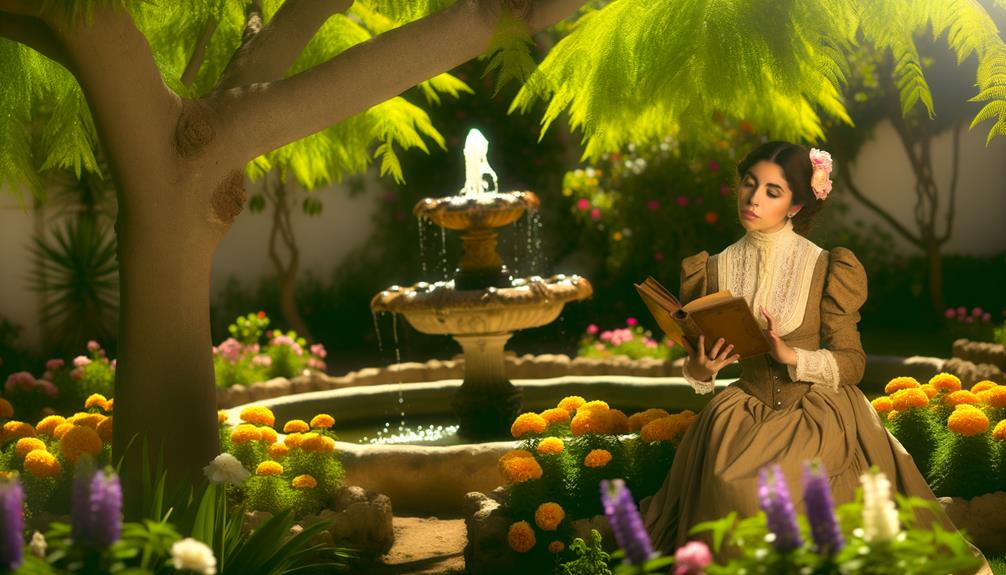Meaning of the Name Philippa
Philippa is a name of Greek origin, derived from "Philippos," which means 'lover of horses.' Historically, it gained prominence in medieval Europe, reflecting admiration for Hellenistic culture and classical antiquity. Common in royal and noble circles, notable figures include Philippa of Hainault and Philippa of Lancaster.
It's associated with leadership, diplomacy, and cultural sophistication. The name garners respect in literature and has variations like Pippa and Pip, which are widely embraced today.
Philippa's rich legacy and elegant appeal make it a timeless choice. To discover more about its historical figures and global impact, continue exploring.

Key Takeaways
- Philippa originates from the ancient Greek name Philippos, meaning 'lover of horses.'
- The name Philippa evolved in medieval Europe, reflecting classical antiquity's cultural influence.
- Historically associated with European royalty and nobility, symbolizing leadership and influence.
- Common diminutives include Pippa, Pip, and Philly, showing linguistic evolution.
- Philippa has a global presence and is popular in the UK, France, Australia, and New Zealand.
Origins of Philippa
The name Philippa traces its origins to the ancient Greek name Philippos, which means 'lover of horses.' This etymology is derived from two Greek components: 'philos' (φίλος) meaning 'friend' or 'admirer,' and 'hippos' (ἵππος) meaning 'horse.'
The masculine form, Philippos, was famously borne by several notable historical figures, including Philip II of Macedon, father of Alexander the Great. As the name evolved into its feminine form, Philippa, it maintained the original connotations but adapted to fit cultural and linguistic norms in various regions. Philippa first emerged in medieval Europe, reflecting the high regard for Hellenistic culture and classical antiquity.
This linguistic shift underscores the enduring influence of ancient Greek civilization on contemporary nomenclature.
Historical Significance
Philippa has held significant historical importance, often associated with royalty and nobility across Europe. The name gained prominence through figures such as Philippa of Hainault, Queen consort of England in the 14th century, who was renowned for her political acumen and charitable endeavors.
Another notable bearer is Philippa of Lancaster, Queen of Portugal, who played an essential role in diplomatic relations between England and Portugal. These historical figures underscore the name's deep-rooted association with leadership and influence.
The use of Philippa in aristocratic circles is reflective of its enduring appeal and the social aspirations of naming conventions among European nobility. Such historical contexts provide a rich backdrop for understanding the name's lasting prestige and cultural significance.
Meaning and Etymology
Rooted in its historical significance, the name Philippa originates from the Greek name Philippos, meaning 'lover of horses.'
The term Philippos is a compound of two Greek words: 'philos' (φίλος), meaning 'loving' or 'fond of,' and 'hippos' (ἵππος), meaning 'horse.' This etymology reflects the cultural importance of horses in ancient Greek society, where they were symbols of status and power.
The feminine form, Philippa, gained prevalence in medieval Europe, particularly in royal and noble circles. The name's enduring appeal can be attributed to its classical roots and the resonance of its meaning.
Understanding the linguistic construction of Philippa provides insight into the values and historical contexts that shaped its usage and perpetuation through generations.
Philippa in Literature
In literary history, the name Philippa has often been employed to evoke a sense of nobility and classical heritage, reflecting its etymological roots and cultural significance.
Derived from the Greek name Philippos, meaning “lover of horses,” Philippa carries connotations of aristocracy and equestrian traditions. This name appears in various historical texts, often associated with characters of high social standing or royal lineage.
For instance, in medieval literature, Philippa is frequently chosen for queens or noblewomen, emphasizing their esteemed positions. The linguistic choice of Philippa in literature not only enhances the character's stature but also aligns with the historical context where names signified societal roles and familial heritage, thereby enriching the narrative with depth and authenticity.
Famous Philippas
Throughout history, numerous prominent individuals bearing the name Philippa have made significant contributions to various fields, thereby cementing the name's legacy in public consciousness.
One notable figure is Philippa of Hainault, Queen of England in the 14th century, renowned for her diplomatic acumen and philanthropic endeavors.
Additionally, Philippa Foot, a 20th-century philosopher, profoundly influenced ethical theory, particularly through her work on virtue ethics.
Another distinguished Philippa is Philippa Gregory, a contemporary author celebrated for her historical novels.
These illustrious individuals illustrate the name's enduring presence and versatility across different eras and disciplines. Their achievements reflect the name Philippa's historical depth and cultural resonance, underscoring its significance in various societal domains.
Variations of the Name
The name Philippa has evolved into various forms and adaptations across different languages and cultures, reflecting its widespread historical and geographical influence. Originating from the Greek 'Philippos,' meaning 'lover of horses,' Philippa has diversified into numerous variants.
In French, it transforms into 'Philippe' for males and 'Philippine' for females, while in Italian, it becomes 'Filippa.' Each variant carries its unique linguistic nuances, yet all retain the core meaning.
- Philippa: The traditional English form, exuding classic elegance.
- Filipa: A simplified, modern variant found in Portuguese and Spanish-speaking regions.
- Pippa: A diminutive form often used affectionately across various cultures.
These variations showcase the adaptability and enduring appeal of the name Philippa across different eras and societies.
Popularity Over Time
Charting its popularity over time, the name Philippa has experienced fluctuating levels of usage, reflecting broader social and cultural trends. Originating from the Greek name Philippos, meaning 'lover of horses,' Philippa gained prominence in medieval Europe, particularly in England, due to its royal associations.
Historical data indicates periodic resurgences coinciding with notable figures bearing the name, such as Philippa of Hainault, the queen consort of Edward III. By the 20th and 21st centuries, its usage saw a decline, correlating with a general decrease in traditional names. Linguistic shifts also influenced its popularity, as modern parents increasingly favored shorter, more contemporary names.
Despite its ebb and flow, Philippa remains a name imbued with historical significance and enduring charm.
Cultural Impact
Philippa's cultural impact is multifaceted, encompassing literature, historical figures, and contemporary media. The name has roots in ancient Greece, symbolizing a lover of horses, and has traversed centuries to remain relevant.
Historical figures like Philippa of Hainault, Queen consort of Edward III, highlight the name's regal heritage. In literature, the name features prominently in classic and modern works, adding depth and gravitas to characters.
- Nostalgia: Philippa invokes memories of medieval queens and noblewomen.
- Resilience: The name's endurance through centuries reflects societal values.
- Elegance: Philippa exudes sophistication, enhancing its literary and historical allure.
Philippa's enduring legacy reveals a name that is deeply woven into the cultural and historical fabric of society.
Modern Usage
In contemporary contexts, the name Philippa has seen a resurgence, particularly among public figures and celebrities who favor its classic elegance.
Variations and diminutives such as Pippa have also gained traction, reflecting its adaptability across cultures.
Globally, the name maintains a notable presence, underscoring its enduring appeal and linguistic versatility.
Popularity Among Celebrities
The name Philippa has recently experienced a resurgence in popularity among celebrities, reflecting a broader trend towards classic and historically significant names. This renewed interest can be attributed to the name's regal connotations and its deep roots in European nobility.
- Elegance: Philippa embodies a timeless sophistication, resonating with those who appreciate historical gravitas.
- Royalty: The name is historically linked to figures such as Philippa of Hainault, Queen of England, underscoring its aristocratic appeal.
- Enduring Charm: Celebrities choosing Philippa for their children often seek a name that balances tradition with modernity.
This revival highlights the name's enduring legacy and its adaptability in contemporary culture, appealing to those who value both heritage and elegance in nomenclature.
Variations and Nicknames
Modern usage of the name Philippa includes a variety of diminutives and nicknames, such as Pippa, Pip, and Philly, which reflect both linguistic evolution and cultural adaptability.
These variations emerge from a historical context where names were often abbreviated for ease of communication and endearment. Pippa, for instance, gained popularity in the English-speaking world partly due to Pippa Middleton, influencing modern trends. Pip and Philly offer phonetic brevity and familiarity, aligning with contemporary preferences for short, approachable names.
Linguistically, these nicknames demonstrate the fluidity of language, where formal names are modified to suit casual and intimate settings. These variations maintain the essence of Philippa while providing flexibility in social and familial contexts.
Global Presence Today
Philippa has established a notable global presence, with its usage extending across diverse cultures and linguistic landscapes. Historically rooted in Greek origins, meaning 'lover of horses,' the name has transcended its initial cultural boundaries.
In modern times, Philippa is appreciated for its classic charm and cross-cultural adaptability.
Europe:
Particularly prevalent in the United Kingdom and France, Philippa exudes a regal and sophisticated aura.
Australia and New Zealand:
The name enjoys popularity, reflecting colonial ties and the influence of British naming conventions.
North America:
Although less common, Philippa's distinctiveness appeals to parents seeking unique yet traditional names.
This widespread adoption underscores Philippa's enduring appeal and versatility, ensuring its relevance in contemporary naming practices.
Conclusion
In summation, the name Philippa, with its roots in Greek etymology meaning 'lover of horses,' has traversed centuries, leaving an indelible mark on historical narratives and literary works alike.
Its variations and persistent popularity underscore its enduring cultural significance.
Like a thread woven through the tapestry of time, Philippa encapsulates both historical gravitas and modern adaptability, illustrating the dynamic interplay between language and identity across eras.






